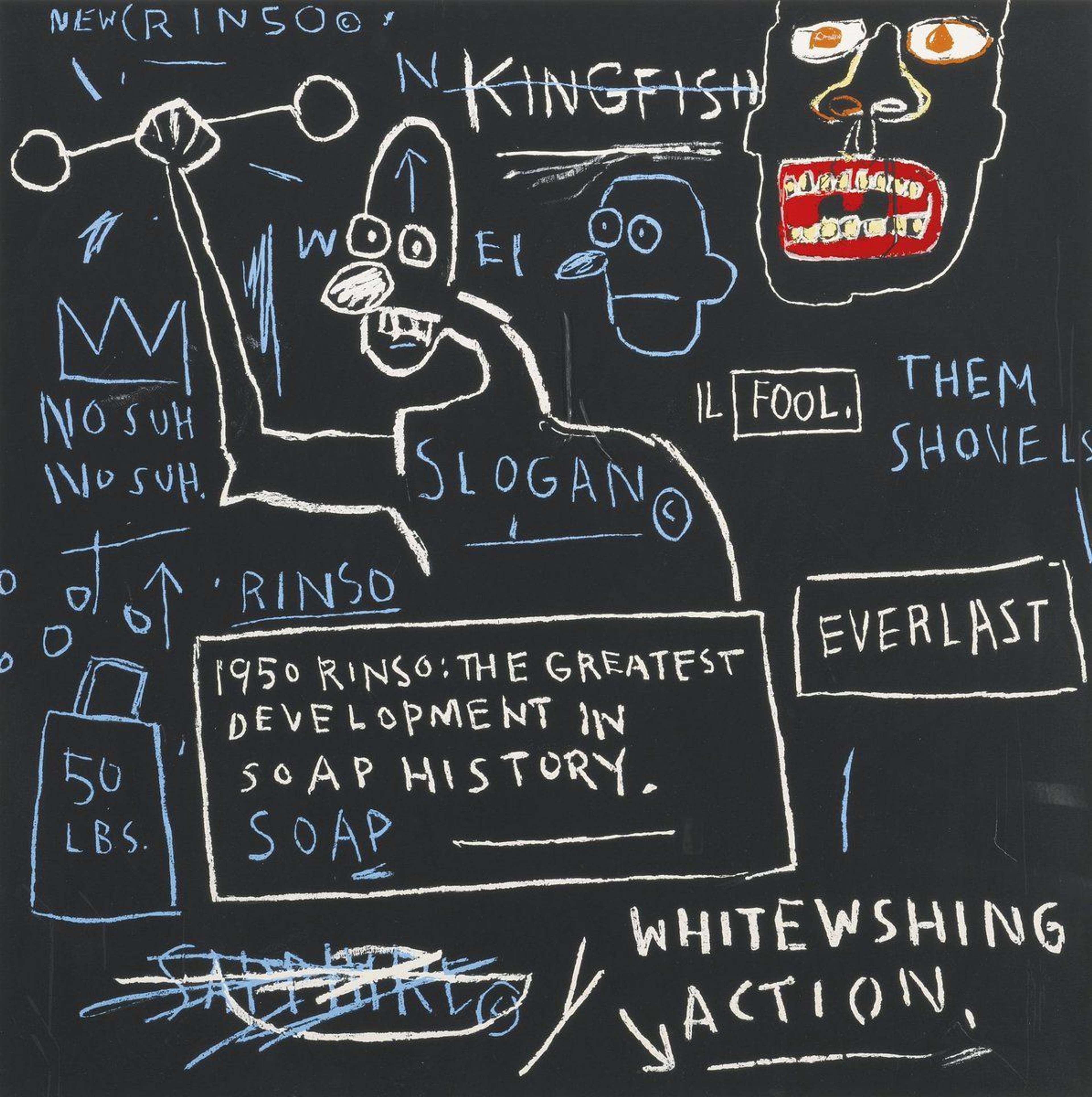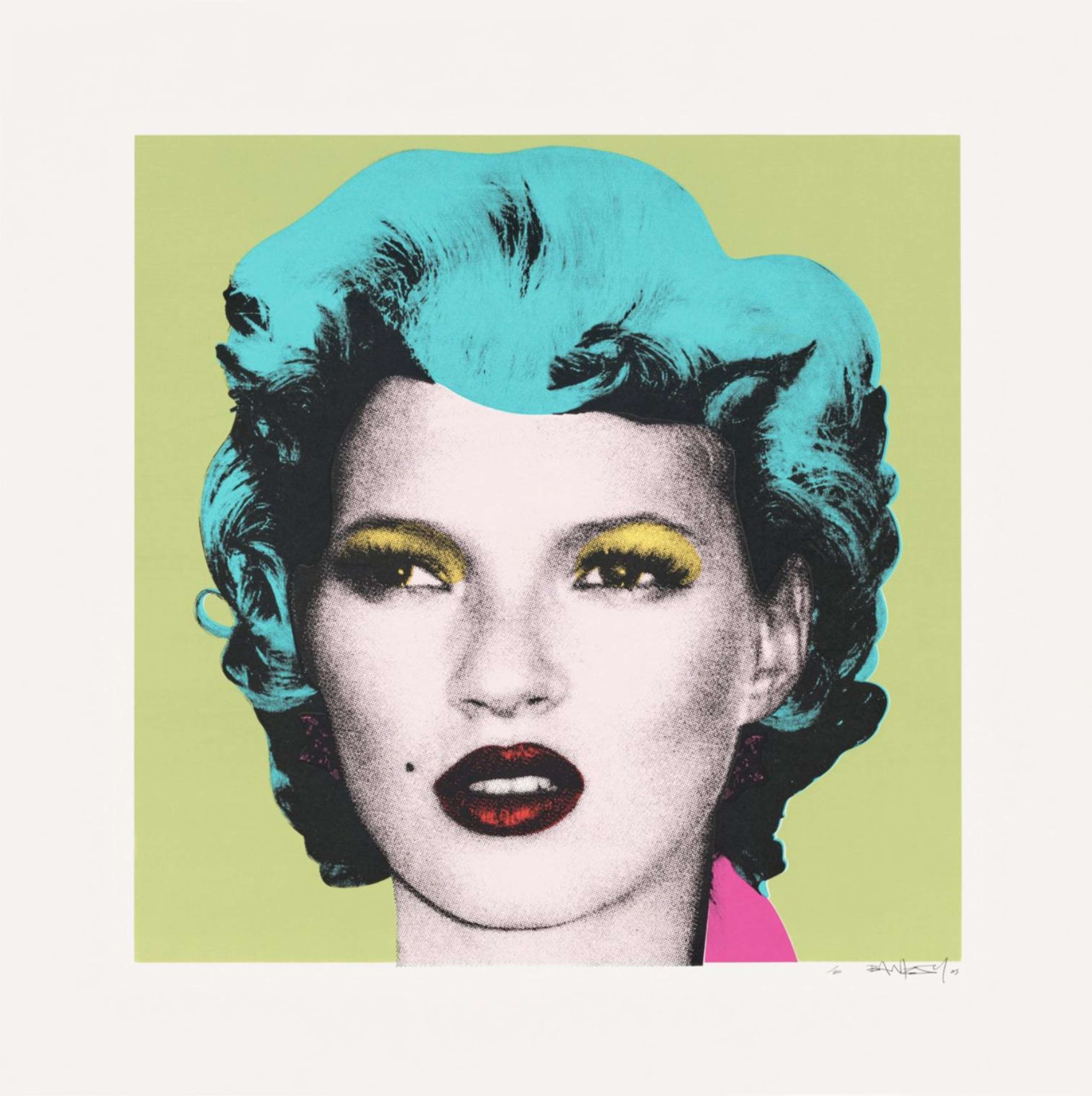Jean-Michel Basquiat and Andy Warhol: An Unlikely Pair
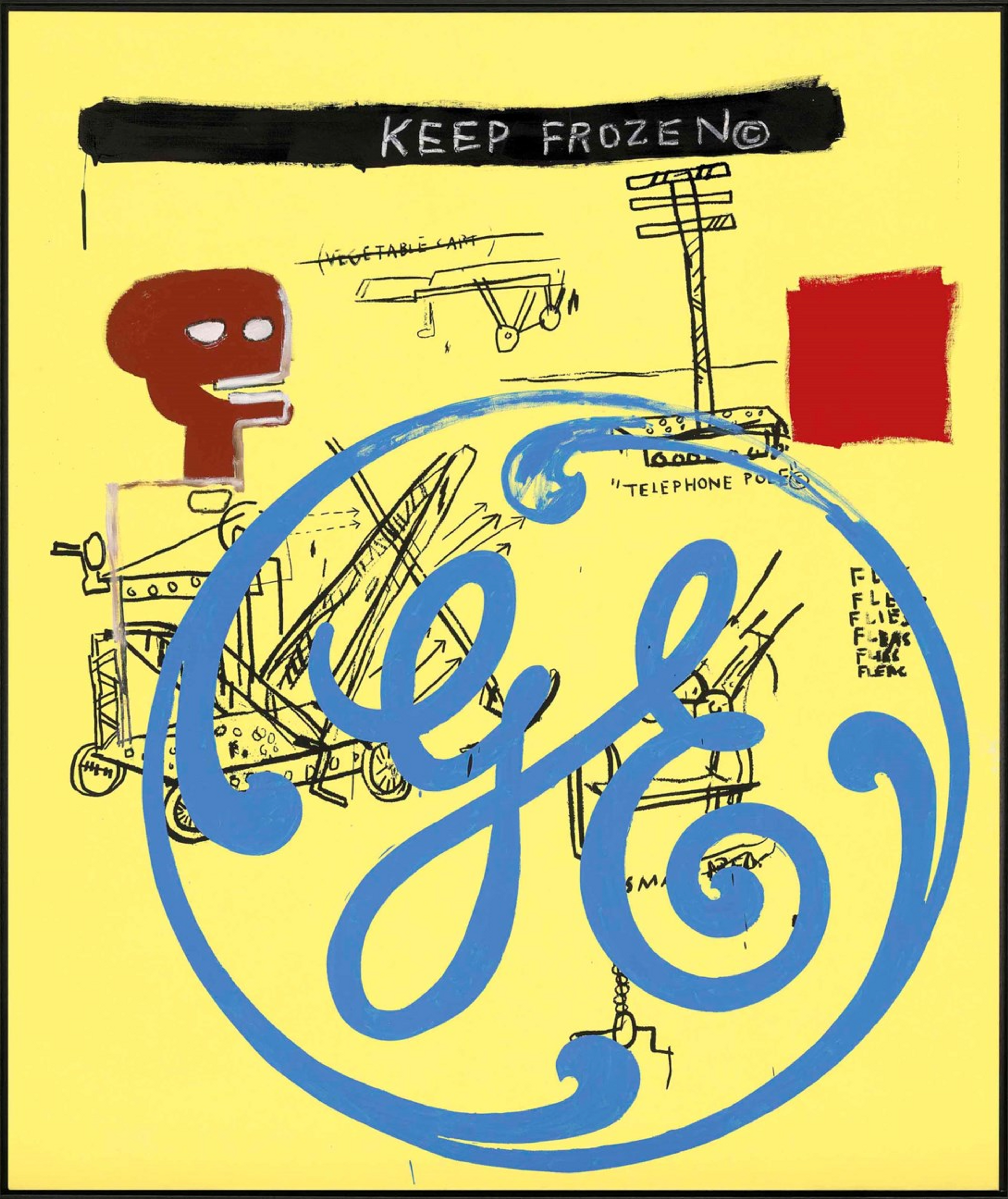 Image © Christie's / Keep Frozen (General Electric) © Andy Warhol and Jean-Michel Basquiat 1985
Image © Christie's / Keep Frozen (General Electric) © Andy Warhol and Jean-Michel Basquiat 1985
Interested in buying or selling
Jean-Michel Basquiat?

Jean-Michel Basquiat
59 works
The defining artistic partnership of the 1980s: the king of Pop Art Andy Warhol and his protégé Jean-Michel Basquiat’s relationship has gone down in art history as one of the most striking — and short-lived — of the contemporary era.
In this article, we take a deeper look at the story behind the pair’s friendship and some of the work it produced, as well as its unfortunate and untimely end in 1986.
 Image © Sotheby's 2013 / General Electric II Basquiat and Warhol © 1984
Image © Sotheby's 2013 / General Electric II Basquiat and Warhol © 1984Who was Basquiat when Warhol met him?
Famed for his use of symbols, including skulls, crowns, and masks, and for his expressive, large-scale portrayals of black American life, artist Jean-Michel Basquiat began his career as a humble graffiti writer.
Working with his friend and collaborator Al Diaz, Basquiat coined the tag SAMO (sometimes written as SAMOã) in the late 1970s. Standing for the phrase ‘same old shit’ — a phrase the pair once coined when smoking marijuana together — the tag underwent a totemic ascent, quickly becoming a commonplace feature of Manhattan’s gritty streets, and commanding the attention of American artist Keith Haring.
How did Andy Warhol meet Jean-Michel Basquiat?
In 1979, Basquiat spotted Warhol dining at the W.P.A. restaurant in Manhattan’s Spring Street with friend and curator, Henry Geldzahler. Introducing himself as a budding artist, Geldzahler dismissed Basquiat as ‘too young’; Warhol ignored his colleague, buying one of the artist’s postcards for US$1.
In 1980, Basquiat abandoned graffiti in favour of a more traditional artistic approach. In the words of art dealer and curator Jeffrey Deitch, during this period the young Basquiat became ‘the most esteemed young artist on the international scene’.
In October 1982, Basquiat visited The Factory – Warhol’s studio-cum-nightclub in Manhattan.
Formally introducing Basquiat to Warhol, Bruno Bischofberger later arranged for the pair to have lunch. They hit it off instantly. By the mid ‘80s, Basquiat’s home and studio was a Manhattan loft owned by Warhol, who had become his de facto patron.
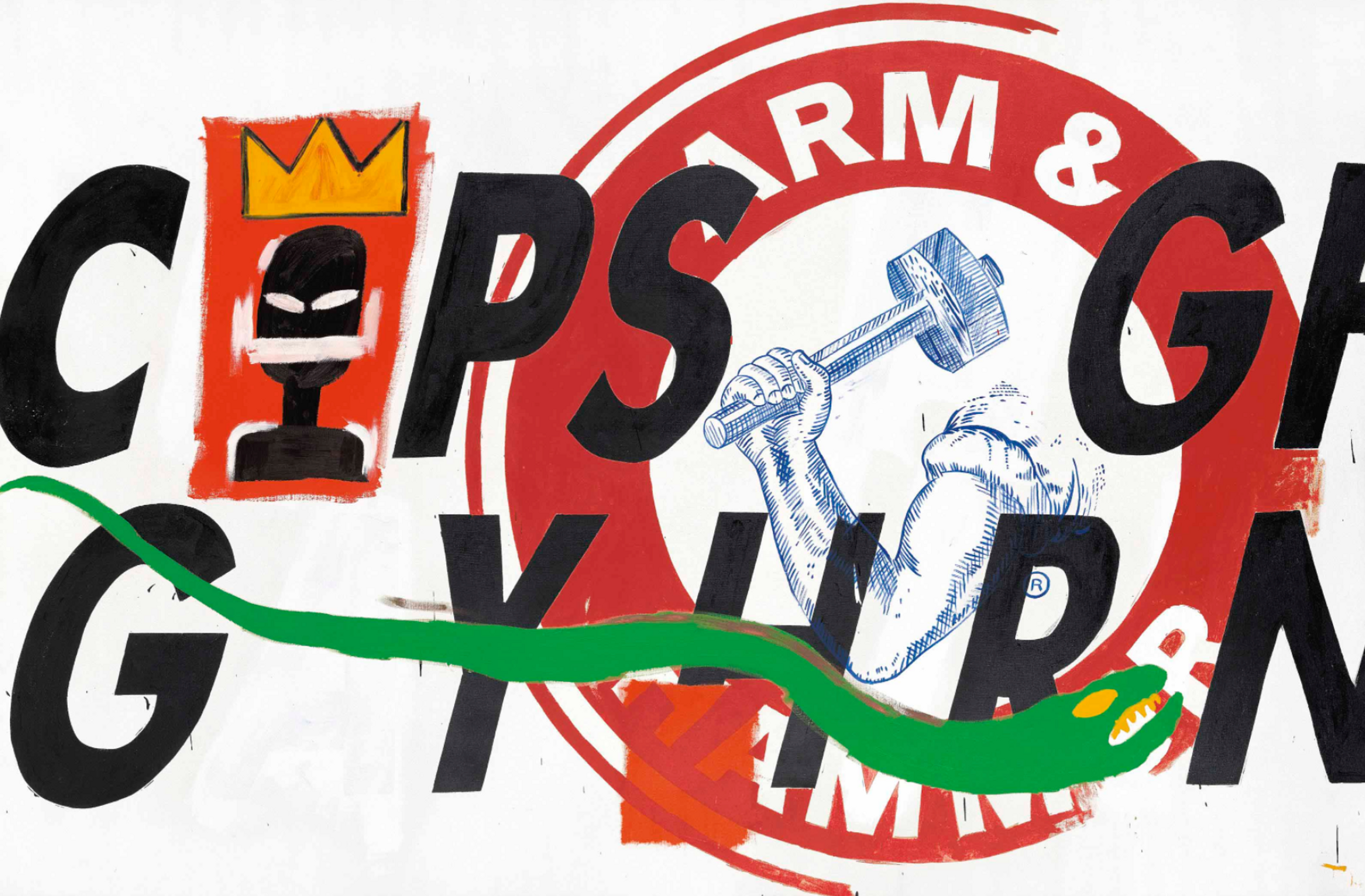 Image © Christie's / Arm and Hammer © Jean-Michel Basquiat and Andy Warhol 1984
Image © Christie's / Arm and Hammer © Jean-Michel Basquiat and Andy Warhol 1984Did Warhol and Basquiat make any artwork together?
When Basquiat and Warhol had their first proper meeting over lunch, in October 1982, Warhol took a self-portrait of the pair with his Polaroid camera.
So the story goes, just 2 hours later, Basquiat sent Warhol a double-portrait painting of the duo together, made after the photograph. It was entitled Dos Cabezas (1982), or ‘two heads’.
Reminiscing on the speed and energy locked into this landmark work, Warhol once said: ‘I mean, just getting to Christie Street [to deliver it] must have taken an hour’.
In 1982, Warhol completed Jean-Michel Basquiat: a work that combines a screen-printed portrait of the named artist and one of Warhol’s so-called ‘piss paintings’ — works created by combining urine and copper-based paint. A dramatic amalgam of Pop Art and Abstract Expressionism, the piece parodied the creative process of Jackson Pollock: the foremost Abstract Expressionist painter of the era.
Later, at the suggestion of Bischofberger, Warhol and Basquiat began working together.
Arm And Hammer II (1984) is one of the most well-known products of the Warhol and Basquiat’s collaboration. Fusing an American consumer icon — the Arm and Hammer baking soda logo — with Basquiat’s signature style and artistic engagement with Black culture (this time in the form of Jazz legend Charlie Parker), it is testament to the strength of the pair’s personal and working relationship.
Untitled (General Electric II) is also the fruit of Warhol and Basquiat’s association. In this work, Warhol’s bold, hard-edged rendition of a consumer logo is, much like the artist himself, reinvigorated by Basquiat’s effervescent, dynamic personality, visible in his loose, painterly style. It is important to remember that by the early 1980s, Warhol was regarded by some as a has-been; here, thanks to Basquiat, he was plunged back into the limelight once again.
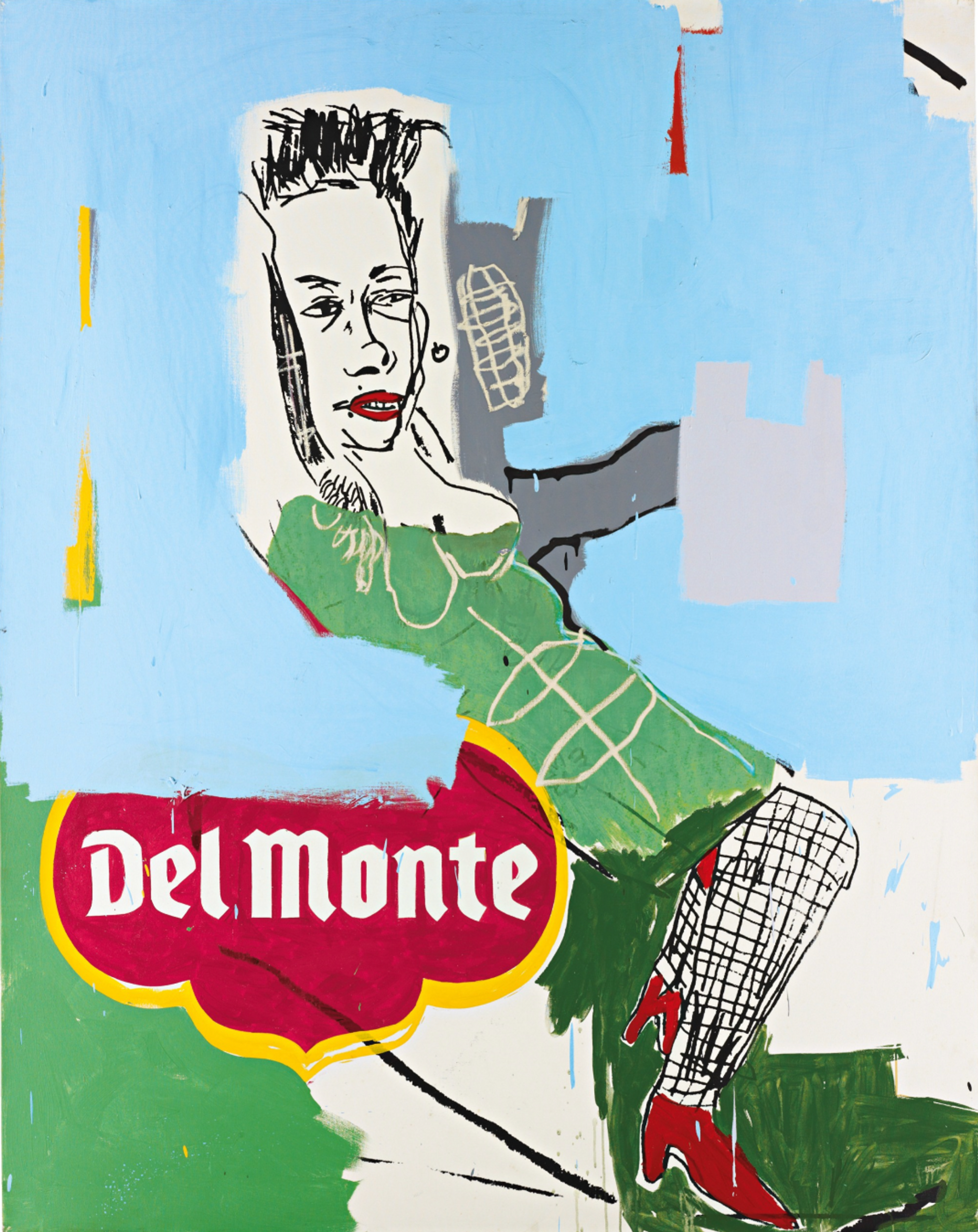 Image © Phillips / Untitled © Jean-Michel Basquiat and Andy Warhol 1984
Image © Phillips / Untitled © Jean-Michel Basquiat and Andy Warhol 1984An unlikely pair?
Warhol and Basquiat came from very different personal and artistic backgrounds.
Warhol was from Pittsburgh and was the so-called ‘father’ of Pop Art: a movement that had begun in the 1960s and which, by the 1980s, was beginning to wane. Basquiat, by contrast, was born in Brooklyn to Haitian and Puerto-Rican parents; he was also the wünderkind of Abstract Expressionism, an exciting new movement penned as a rival to Pop Art by many.
Despite their differences, however, the pair had an enormous impact on each other, working to both challenge and expand their artistic output and birthing newfound modes of expression.
For example, Basquiat convinced Warhol to take up freehand painting again; conversely, Basquiat started to experiment with screen printing — a medium for which Warhol was world-famous — for the first time.
Basquiat and Warhol both courted criticism for their collaborations. Although charged with ‘propping each other up’, the pair worked on an even footing, allowing creative decisions to be made spontaneously in the studio.
In 1985, Basquiat described their collaboration, saying:
‘He would put something very concrete or recognizable, like a newspaper headline or a product logo, and then I would try and deface it, and then I would try and get him to work some more on it. I would try to get him to do at least two things, you know? He likes to do just one hit and then have me do all the work after that.’
In an interview, Warhol addressed his younger collaborator, joking: ‘We’re doing some work together, and you paint me out […] everything I’ve done you’ve painted me out’.
 Image © Phillips / Third Eye © Jean-Michel Basquiat and Andy Warhol 1985
Image © Phillips / Third Eye © Jean-Michel Basquiat and Andy Warhol 1985How long were Basquiat and Warhol friends?
Sadly, the breakdown of their relationship came quickly and drastically.
In Michael Halsband’s world-famous photograph, Andy Warhol And Jean-Michel Basquiat (1985), the playful competitiveness that characterised the duo and their co-creations comes to the fore, reminding us that each artist was the perfect ‘match’ for the other. This image featured on the exhibition poster for ‘Andy Warhol and Jean-Michel Basquiat’, a gallery show held at the Tony Shafrazi Gallery in 1985.
Unfortunately, this gallery show — whilst being one of the great art events of the 1980s — would be the pair’s last.
The critical reaction to the show was poor, with Basquiat being called Warhol’s ‘mascot’ in a New York Times article. Despite harsh reviews, Warhol became Basquiat’s landlord; Basquiat, who had been a heroin user, began taking drugs heavily.
It became an embarrassment for the pair to then even be seen together. Basquiat soon stopped calling Warhol, and the pair ceased collaborating. Unfortunately, their relationship never really recovered. In 1987, Warhol died suddenly; Basquiat would die a year later, in 1988.
 Image © Sotheby's / Untitled (two dogs) © Jean-Michel Basquiat and Andy Warhol 1984
Image © Sotheby's / Untitled (two dogs) © Jean-Michel Basquiat and Andy Warhol 1984Basquiat and Warhol today
The whirlwind relationship between Warhol and Basquiat has inspired exhibitions, films, and as of 2022, even a play.
In 1996, artist Julian Schnabel co-wrote a feature-length biographical drama film entitled Basquiat. Featuring Jefrrey Wright (as Basquiat), David Bowie (as Warhol), Dennis Hopper, Christopher Walken, and Gary Oldman, the film was a critical success.
In 2021, a new exhibition entitled Warhol and Basquiat in Focus: Works from the Permanent Collection opened at the Andy Warhol Museum, a collection located in the artist’s hometown of Pittsburgh, Pennsylvania.
This year, in 2022, the pair are the subject of a new stage play by writer Anthony McCarten, entitled The Collaboration. You can see it at London’s Young Vic theatre.
Who owns the Basquiat Warhol paintings now?
While there are many Basquiat x Warhol collaborative paintings in private possession, the artwork generated by their collaboration that was most recently in the spotlight is Warhol's Jean-Michel Basquiat portrait. The portrait was put up for sale at auction at Christie's in 2021. A collector of both artists, the consigner Peter Brant, will have not been disappointed with the final hammer price: $34,700,000 (USD). The lot was the most expensive of the sale and beat auction houses estimates by nearly $15,000,000. It is not known who purchased the painting.
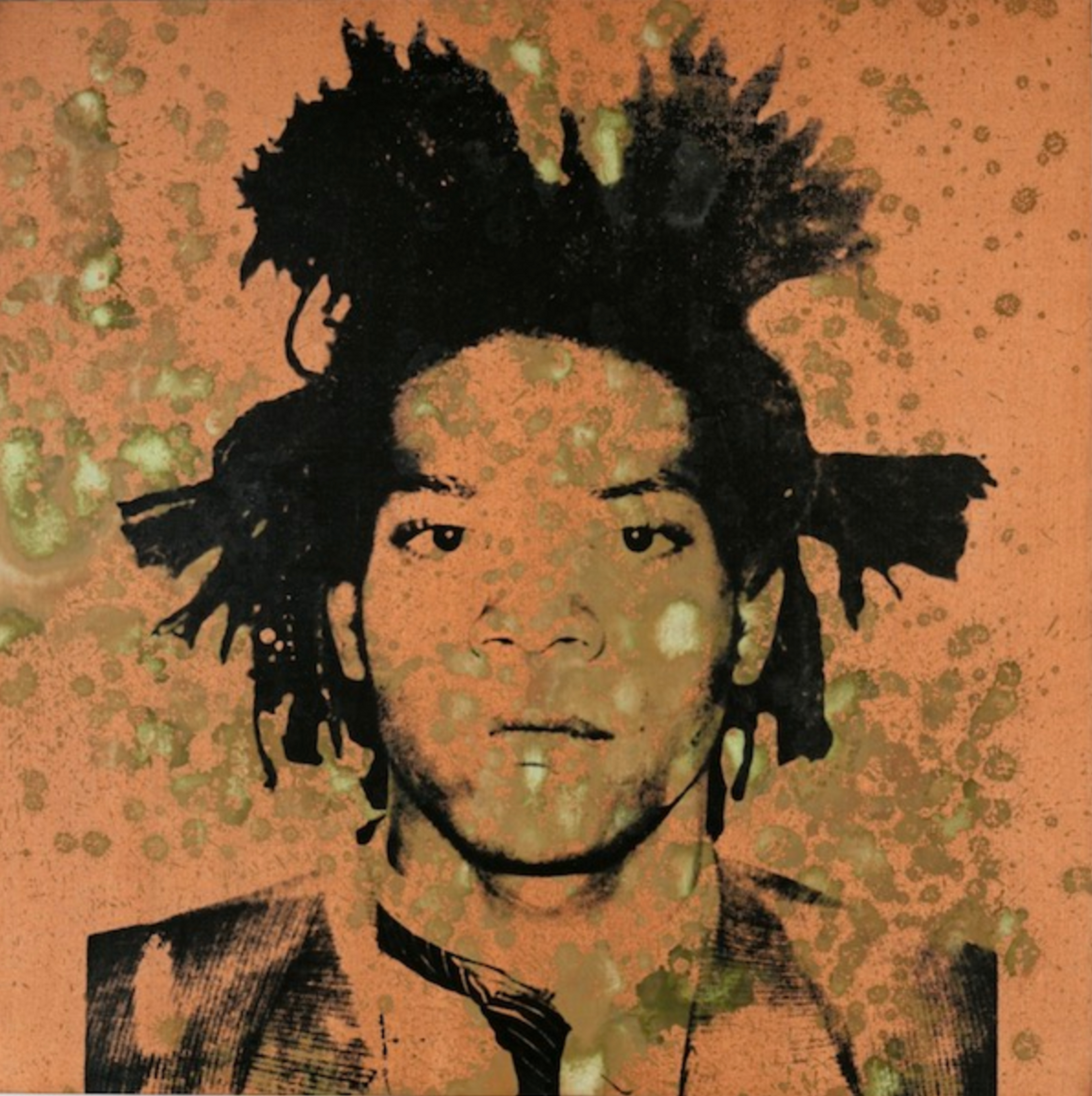 The Portrait of Basquiat by Warhol, fruition of their partnership, that sold for $34,700,000. (Image © Christie's / Jean-Michel Basquiat © Andy Warhol 1982)
The Portrait of Basquiat by Warhol, fruition of their partnership, that sold for $34,700,000. (Image © Christie's / Jean-Michel Basquiat © Andy Warhol 1982)